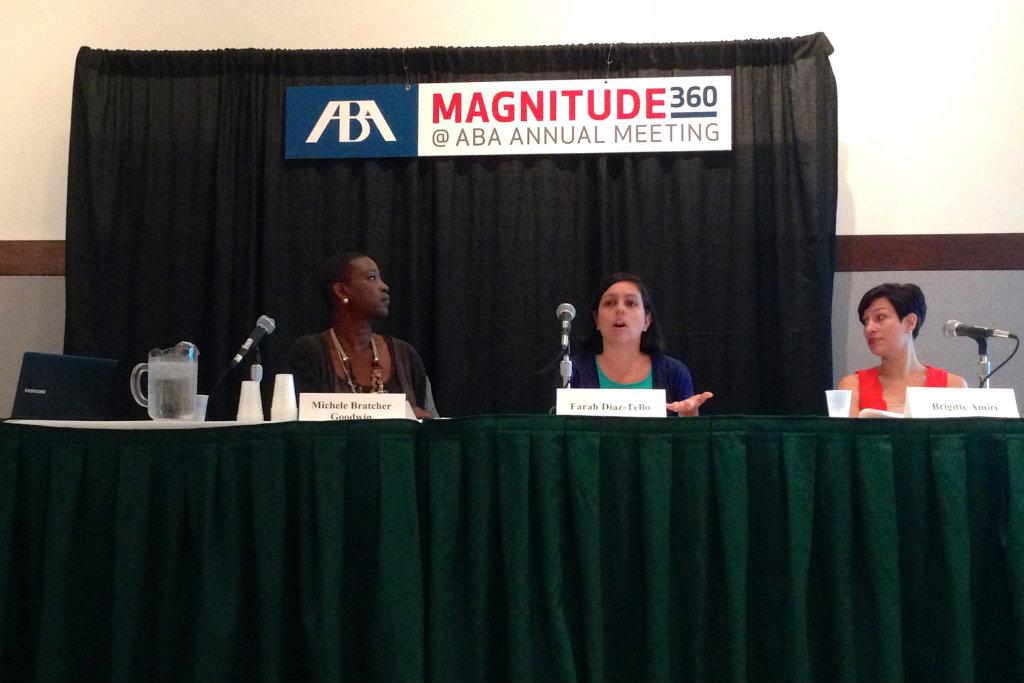US lawyers say movement to protect the unborn increasingly hurts mothers
Lawyers Michele Goodwin (left), Farah Diaz-Tello and Brigitte Amiri discuss the implications of the Hobby Lobby decision and other legislation limiting women’s rights at a panel during the American Bar Association annual meeting. The talk was held Saturday, Aug. 9 at the Hynes Convention Center in Boston.
BOSTON – The legal battle over reproduction is increasingly focused on unborn children while criminalizing mothers, said to a panel of lawyers and women’s rights advocates who spoke at the American Bar Association’s (ABA) annual meeting Saturday.
“Women’s medical rights [are] treated as though they don’t exist at all,” said Farah Diaz-Tello, staff attorney for the National Advocates for Pregnant Women and one of the panel’s three speakers.
The discussion focused on the growing power of government over women’s bodies and health care decisions. More states are passing laws that place the personhood of the fetus above the constitutional rights of the pregnant woman, the speakers said. In many cases, matters of health and personal freedom tangle with questions of religious freedom and corporate power.
In Burwell v. Hobby Lobby, the US Supreme Court ruled that that owners of "closely held" corporations could cite religious reasons to be exempt from certain laws – in this case, insurance coverage for contraception as required by the Affordable Care Act.
A company is considered closely held if five or fewer shareholders own at least half of its stock.
The Hobby Lobby decision is an example of how religious freedom is being used “as an umbrella for justifying the limiting of women’s rights,” said Michele Bratcher Goodwin, director for the Center for Biotechnology and Global Health Policy at the University of California-Irvine School of Law.
In the last few years, religious schools across the country have fired teachers for getting pregnant out of wedlock or using in vitro fertilization (IVF). States have also passed laws that allow pharmacies to refuse to fill prescriptions if they reasonably believe the medication could cause abortion.
Such laws give “more legal protection to … health care providers who refuse to participate in abortions” based on their beliefs, Kansas Governor Sam Brownback’s office told the Chicago Tribune after he signed their bill in 2012.
“We have been falling down a mountain in this issue,” Goodwin said.
The government is also increasingly intervening in the medical arena.
Diaz-Tello discussed the recent case of Jennifer Goodall of Cape Coral, Fla., who had wanted to deliver her fourth child vaginally, unless complications during labor required intervention. On July 10, Goodall’s 39th week, the Bayfront Health Port Charlotte sent her a letter saying they believed she needed a Cesarean section to ensure her and her child’s health and safety.
Vaginal births are not recommended for women who have had more than two prior C-sections. Goodall had three C-sections before her latest pregnancy, but decided to try vaginal delivery after weighing the risks and benefits, according to a motion her lawyers filed in Florida district court.
The hospital warned Goodall it would inform state child welfare services of her refusal and use the judicial process to make her undergo the procedure. Goodall’s doctors would also perform the C-section with or without her consent.
“[It seems] having one’s body cut open is somewhere above a stop-and-frisk, somewhere below an execution,” said Brigitte Amiri, senior staff attorney for the American Civil Liberties Union’s (ACLU) Reproductive Freedom Project.
Thirty-eight states currently have laws against fetal homicide, and at least 23 apply to the earliest stages of pregnancy, according to the National Conference of State Legislatures. Under federal law, the Unborn Victims of Violence Act of 2004 classifies a fetus as a legal victim if the unborn child is injured or killed as a result of certain federal crimes.
Proponents of these laws say that if the fetus is defined as a person, families would have a legal means of prosecuting suspects who cause the death of unborn children through violence. Heather Surovik, for instance, led a 2013 petition to amend Colorado state law after a drunk driver slammed into her car while she was pregnant.
“This is really just getting justice,” Surovik said in a news conference. “All of those babies that have died from acts of violence, domestic violence, everything, they deserve to have justice, those moms deserve to have justice.”
Opponents argue that such laws "make every pregnant woman the potential perpetrator of a violent crime—whether she has an abortion, experiences a pregnancy loss, or goes to term having done anything … that someone views as creating a risk to the fertilized egg, embryo or fetus,” Lynn Paltrow, executive director of the nonprofit National Advocates for Pregnant Women, told NBC News.
“It’s more than … criminalization,” Diaz-Tello said at the panel. “It’s about establishing personhood for fertilized eggs and removing personhood from pregnant women.”
More on GlobalPost: Q&A: U.S. Justice Ginsburg on Hobby Lobby, gay marriage, retirement
